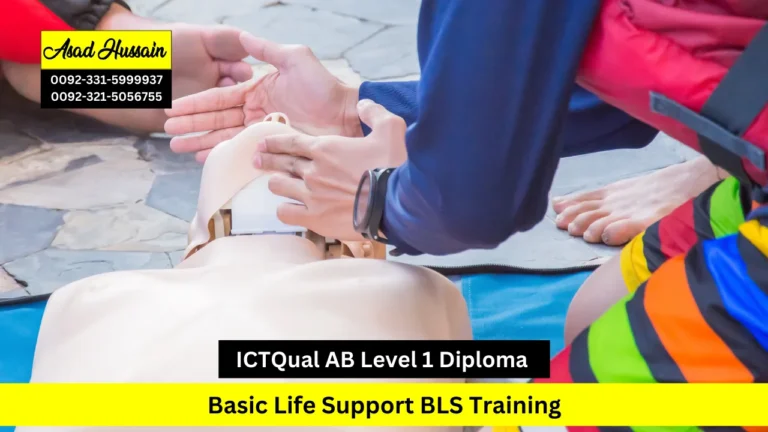Providing high-quality care and support is at the heart of health and social care professions. The ICTQual Level 3 Diploma in Health and Social Care is a comprehensive program designed for individuals seeking to develop advanced knowledge, practical skills, and professional competence in delivering person-centered care. This diploma equips learners with the expertise needed to support diverse client needs while adhering to ethical, legal, and regulatory standards.
The ICTQual Level 3 Diploma in Health and Social Care covers a wide range of essential topics, including communication in care settings, safeguarding and protection, health and safety, mental health awareness, person-centered care, and professional development. Learners will gain both theoretical understanding and hands-on experience, enabling them to assess care needs, plan and implement support strategies, and evaluate outcomes effectively. Practical applications are emphasized through case studies, role-playing, and real-world simulations, ensuring participants can translate knowledge into effective care practices.
Through ICTQual Level 3 Diploma in Health and Social Care, learners will develop critical skills such as empathy, effective communication, risk assessment, care planning, and collaborative teamwork. The curriculum also highlights the importance of promoting equality, diversity, and inclusion in care settings, ensuring that graduates are prepared to meet the individual needs of service users with professionalism and compassion.
Graduates of the ICTQual Level 3 Diploma in Health and Social Care will be well-prepared for roles such as Care Worker, Support Worker, Senior Care Assistant, or Health and Social Care Practitioner, equipped to deliver safe, ethical, and high-quality care. By combining theoretical knowledge with practical expertise, this diploma empowers learners to enhance their careers while making a positive impact on the lives of individuals and communities in health and social care settings.
Program Highlights
Study Units
- Professional Standards and Codes of Practice in Health and Social Care
- Leadership and Team Management in Care Settings
- Specialist Care and Supporting Complex Needs
- Advanced Safeguarding and Crisis Intervention
- Health Promotion and Disease Prevention
- Continuous Professional Development and Reflective Practice
To enroll in the ICTQual Level 3 Diploma in Health and Social Care, applicants must meet specific academic, professional, and language requirements. These criteria ensure learners are prepared to engage with advanced concepts in care delivery, safeguarding, and professional practice, enabling them to provide high-quality support to individuals across diverse health and social care settings.
Age Requirements
- Applicants must be at least 18 years old to enroll in the program.
- Mature learners with relevant experience in care settings are encouraged to apply.
Educational Requirements
- A minimum of a Level 2 qualification in Health and Social Care, or equivalent, is preferred.
- Candidates with prior healthcare, social care, or vocational training may also be considered.
Professional Experience
- Experience in a care setting, volunteering, or supporting vulnerable individuals is advantageous.
- Applicants should demonstrate an understanding of basic health, safety, and care principles.
English Language Proficiency
- Non-native English speakers must provide proof of English proficiency, such as IELTS (minimum 5.5) or an equivalent qualification.
- Evidence of previous education or professional experience in English-medium environments may also be accepted.
The ICTQual Level 3 Diploma in Health and Social Care is designed to equip learners with advanced knowledge, practical skills, and professional competence required to provide high-quality care and support. Graduates will develop the ability to manage care delivery, uphold professional standards, and respond effectively to complex needs, preparing them for senior roles in health and social care settings.
Professional Standards and Codes of Practice in Health and Social Care
- Understand and apply professional standards, ethical principles, and codes of practice in care settings.
- Ensure compliance with legislation, policies, and best practice guidelines.
- Demonstrate integrity, accountability, and professionalism in all care interactions.
- Recognize the importance of confidentiality, dignity, and respect for service users.
- Evaluate practices against regulatory frameworks to maintain high-quality care.
Leadership and Team Management in Care Settings
- Develop skills to lead and motivate care teams effectively.
- Implement strategies to promote collaboration, communication, and staff engagement.
- Manage workloads, delegate responsibilities, and coordinate care delivery efficiently.
- Support team members in professional development and performance improvement.
- Resolve conflicts and foster a positive, inclusive working environment.
Specialist Care and Supporting Complex Needs
- Understand the diverse needs of individuals with complex physical, mental, or social challenges.
- Develop personalized care plans tailored to specific requirements.
- Apply evidence-based approaches to support individuals with chronic conditions or disabilities.
- Use appropriate interventions to enhance quality of life and independence.
- Evaluate outcomes and adjust care strategies to meet evolving needs.
Advanced Safeguarding and Crisis Intervention
- Recognize signs of abuse, neglect, or harm and implement safeguarding procedures.
- Apply appropriate crisis intervention techniques in emergency or high-risk situations.
- Collaborate with multidisciplinary teams to protect vulnerable individuals.
- Maintain accurate records and report incidents according to legal and organizational requirements.
- Evaluate safeguarding policies and practices to ensure continuous improvement.
Health Promotion and Disease Prevention
- Understand principles of public health, wellness, and preventive care.
- Promote healthy lifestyles and support behavior change among service users.
- Deliver education and interventions to reduce risks of disease and injury.
- Assess the effectiveness of health promotion initiatives in care settings.
- Integrate community resources and support networks to enhance wellbeing.
Continuous Professional Development and Reflective Practice
- Engage in reflective practice to evaluate personal and professional performance.
- Identify areas for improvement and develop targeted learning plans.
- Maintain up-to-date knowledge of emerging health and social care practices.
- Apply feedback and self-assessment to enhance care delivery.
- Demonstrate commitment to lifelong learning and professional growth.
Conclusion
Upon completing the ICTQual Level 3 Diploma in Health and Social Care, learners will possess the knowledge, skills, and professional competence required to deliver safe, ethical, and high-quality care. Graduates will be prepared for roles such as Care Worker, Support Worker, or Health and Social Care Practitioner, capable of managing complex needs, promoting wellbeing, and contributing positively to health and social care organizations.
The ICTQual Level 3 Diploma in Health and Social Care is designed for individuals seeking to advance their knowledge and skills in delivering high-quality care and support. This program is suitable for learners aiming to work in diverse care settings, develop professional competence, and pursue a career in health and social care services.
Educational Instructors and Trainers
- Educators in health, social care, or related fields who wish to update their curriculum with advanced care principles and professional standards.
- Trainers seeking to develop practical teaching methods for care skills, safeguarding, and leadership in care environments.
Environmental Advocates and Activists
- Individuals involved in promoting wellbeing, community health, or public health awareness programs.
- Advocates aiming to support vulnerable populations and integrate sustainable practices in care provision.
Students and Recent Graduates
- Recent graduates in nursing, social work, or health-related fields seeking practical experience and professional qualification in care delivery.
- Students looking to gain essential skills in patient care, safeguarding, and professional standards to enhance employability.
Career Changers
- Professionals from other industries wishing to transition into health and social care roles.
- Individuals seeking recognized qualifications to establish credibility and career growth in care settings.
Policy Makers and Regulators
- Healthcare administrators, policy advisors, or regulators aiming to understand frontline care practices and standards.
- Professionals responsible for developing or monitoring health and social care policies and compliance frameworks.
Conclusion
This program is ideal for learners committed to delivering safe, ethical, and high-quality care. Graduates will acquire the knowledge, practical skills, and professional competence required to work effectively in health and social care roles, making a meaningful impact on the wellbeing of individuals and communities.







